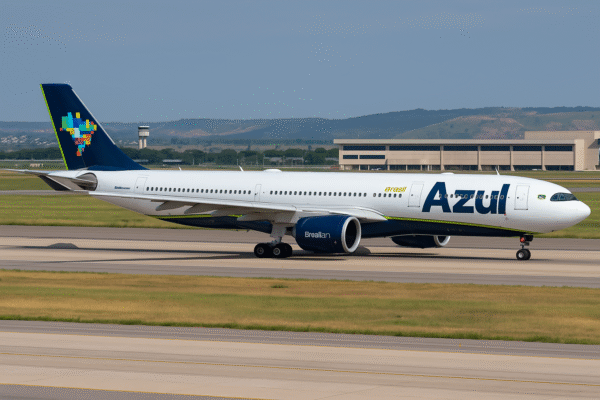Recife, Brazil – July 25, 2025 – In a real-time demonstration of aviation safety and emergency preparedness, Azul Airlines Flight AD8803, operating a transatlantic route from Porto, Portugal to Campinas, Brazil, made an unscheduled landing at Recife International Airport due to a medical emergency involving a crew member. The swift diversion ensured the affected pilot received immediate medical care while keeping all passengers and crew safe.
The incident took place mid-flight aboard an Airbus A330-900neo cruising at 38,000 feet over the Atlantic Ocean. With safety as the top priority, the flight crew declared an emergency and coordinated with air traffic control to divert the aircraft to the nearest suitable airport—Recife/Guararapes–Gilberto Freyre International Airport (REC).
Emergency Response: Speed and Precision
Flight AD8803 touched down safely at 12:41 PM local time on Recife’s Runway 18, where a ground medical team was already on standby. The pilot experiencing the health issue was promptly treated. While Azul Airlines has not disclosed the specific nature of the medical condition due to privacy concerns, sources indicate the response was fast and aligned with standard emergency protocols.
The aircraft remained on the ground for 1 hour and 45 minutes, during which Azul’s operational teams assessed the situation, ensured the remaining flight crew met all long-haul regulatory requirements, and prepared the aircraft for the continuation of the journey.
Passenger Impact: Transparent and Calm Handling
Despite the unexpected detour, Azul Airlines managed the situation effectively with clear communication to the 272 passengers onboard. The airline confirmed that no other medical emergencies or operational issues occurred during the diversion. Refreshments were provided, and passengers remained onboard the aircraft during the short stopover.
After the crew completed safety checks and regulatory documentation, the aircraft resumed its flight to São Paulo’s Viracopos–Campinas International Airport (VCP), arriving just under three hours behind schedule. Many passengers commended the crew for their professionalism and transparency throughout the incident.
Aircraft Overview: The Airbus A330-900neo
Flight AD8803 was operated using Azul’s Airbus A330-900neo, a next-generation widebody aircraft designed for long-haul operations. Known for its fuel efficiency and passenger comfort, the A330-900neo forms the backbone of Azul’s transatlantic fleet. It features modern cabin amenities, an upgraded business class experience, and industry-standard cockpit technology.
According to Airbus, the A330-900neo is built for operational resilience, and Azul’s handling of the mid-flight emergency further showcased the platform’s capabilities under pressure.
Operational Resilience: Azul’s Safety Protocols in Action
Azul Airlines, one of Brazil’s leading carriers, emphasized that its operational procedures prioritize passenger and crew safety above all. “Our crews are trained for all scenarios, including rare mid-flight health events,” said a company spokesperson. “We commend the professionalism of our pilots and cabin crew for maintaining safety and composure throughout.”
Long-haul flights such as Porto to Campinas are typically crewed by at least two qualified pilots, with additional relief pilots on board when necessary. Aviation regulations by Brazil’s ANAC (Agência Nacional de Aviação Civil) mandate sufficient crew coverage to handle unexpected events like this one. Azul’s ability to continue the journey without requiring passenger disembarkation illustrates compliance and readiness.
Broader Context: Medical Diversions in Aviation
While rare, in-flight medical emergencies involving crew or passengers are a reality in commercial aviation. Airlines must prepare for such scenarios with clear decision trees, real-time monitoring tools, and pre-coordinated airport support.
Recife International Airport, strategically located in northeastern Brazil, serves as an important diversionary airport for flights traversing the Atlantic. Its facilities and emergency response infrastructure make it a preferred stopover when flights experience en-route disruptions.
Minimal Travel Disruption and Reassured Travelers
Despite the potential for delays and inconvenience, most passengers viewed the diversion with understanding. Many noted the airline’s responsible response and were thankful for the safety-first approach. “I’d rather arrive three hours late than risk a crew member’s life or safety,” said one passenger interviewed upon landing in Campinas.
Azul also reassured passengers that affected travel itineraries, including onward domestic flights and international connections, would be accommodated or rebooked without additional charge.
Looking Ahead: Confidence in Brazilian Aviation
Brazil’s aviation sector continues to build confidence among global travelers with a strong emphasis on safety, efficiency, and service. Events like the successful diversion of Flight AD8803 underline the robustness of Brazil’s air traffic control infrastructure, airport emergency response systems, and airline crisis management readiness.
The country has seen steady international passenger growth in 2025, particularly from Europe. According to Brazil’s Ministry of Tourism, inbound air arrivals increased 22% in the first half of the year compared to 2024, with Portugal ranking among the top five source markets.
Final Thoughts
While unexpected, Azul Airlines’ mid-flight emergency and the subsequent landing in Recife serve as a reminder of the airline industry’s unwavering commitment to safety. The timely action, professional execution, and minimal disruption exemplify best practices in global aviation.
As international travel between Europe and Brazil continues to grow, passengers can feel reassured knowing that airlines like Azul are prepared, capable, and deeply invested in maintaining high safety standards—even at 38,000 feet.
For more travel news like this, keep reading Global Travel Wire





















